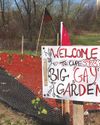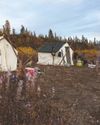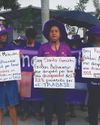Versuchen GOLD - Frei
Busted
Briarpatch
|November/December 2018
Aaron Doncaster was fired from his job for organizing a union. But in Alberta, workers have new protection against union-busting bosses.

Three weeks into an organizing drive at the Hilton Garden Inn, labour organizer Aaron Doncaster was feeling confident. He was working as a dishwasher at the hotel in downtown Calgary, where workers say they were dealing with safety issues on the job, disrespect from management, favouritism, and improper pay practices. But Doncaster was encouraged by his co-workers’ reaction to the idea of coming together and forming a union. He spent time convincing co-workers they had an opportunity to stand together, and signing people up for union cards. Then, three weeks into the organizing drive, he was fired.
Doncaster says the Hilton Garden Inn fired him after conducting a spot audit, which revealed a pattern of tardiness. But Doncaster believes he was fired for trying to organize a union. The Hilton did not respond to requests for comment.
The United Food and Commercial Workers (UFCW) Local 401 pursued a complaint at the Alberta Labour Relations Board (ALRB) on Doncaster’s behalf. In a decision written by Gwen J. Gray, Q.C., the labour relations board agreed: Doncaster had been fired by the Hilton for exercising his right to organize a trade union at his workplace.
The Hilton likely believed that by firing Doncaster, they could intimidate other workers and end the unionization drive. But the workers got their union when the ALRB ordered remedial certification for their workplace. In other words, because it is illegal to fire workers for organizing a union, and because the Hilton broke the law when they fired Doncaster for doing just that, Hilton workers got the union they had been fighting for.
Diese Geschichte stammt aus der November/December 2018-Ausgabe von Briarpatch.
Abonnieren Sie Magzter GOLD, um auf Tausende kuratierter Premium-Geschichten und über 9.000 Zeitschriften und Zeitungen zuzugreifen.
Sie sind bereits Abonnent? Anmelden
WEITERE GESCHICHTEN VON Briarpatch

Briarpatch
PLATFORMS FOR PEOPLE, NOT PROFIT
Digital platforms boast that they’ve “democratized” cultural production. But what would truly democratic platforms look like in Canada?
10 mins
January/February 2020

Briarpatch
ORGANIZING THROUGH LOSS IN THE HEART OF OIL COUNTRY
The story of climate justice organizing in Alberta, at the heart of the tarsands, is the story of a group of young activists learning what it means to lose, and keep on fighting
13 mins
January/February 2020

Briarpatch
GROWING THE LABOUR MOVEMENT
How unions are using community gardens to engage members, nourish communities, and help strikers weather the picket line
11 mins
January/February 2020

Briarpatch
A NEW ERA FOR OLD CROW
In the Yukon’s northernmost community, the Vuntut Gwitchin First Nation is reckoning with how to preserve their land and culture, amid a warming climate and an influx of tourists
16 mins
January/February 2020

Briarpatch
“At Least Hookers Get Wages”
The risky business of sex work in the gig economy
14 mins
November/December 2019

Briarpatch
The Literal – And Literary – Futures We Build
Briarpatch editor Saima Desai talks to two judges of our Writing in the Margins contest about Idle No More and MMIWG, ethical kinship, writing queer sex, and their forthcoming work.
9 mins
November/December 2019

Briarpatch
The Cost Of A T-Shirt
In Honduras, women maquila workers are fighting back against the multinational garment companies that they say are endangering their health and safety.
18 mins
November/December 2019

Briarpatch
Milking Prison Labour
Canada’s prison farms are being reopened. But when prisoners will be paid pennies a day, and the fruits of their labour will likely be exported for profit, there’s little to celebrate.
12 mins
November/December 2019

Briarpatch
Bringing Back The Beat
In mainstream media, labour journalism has been replaced by financial reporting and business sections. But journalism students are raising the labour beat from the grave.
10 mins
November/December 2019

Briarpatch
There's No Journalism On A Dead Planet
Corporate media owners are killing local newspapers – which is making it impossible for everyday people to understand the on-the-ground impacts of the climate crisis
18 mins
September/October 2019
Translate
Change font size
